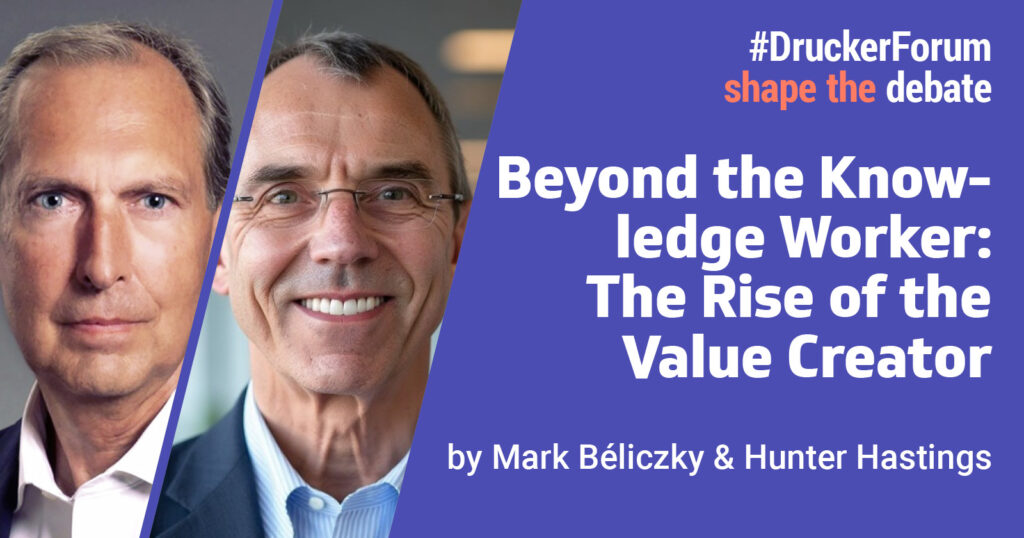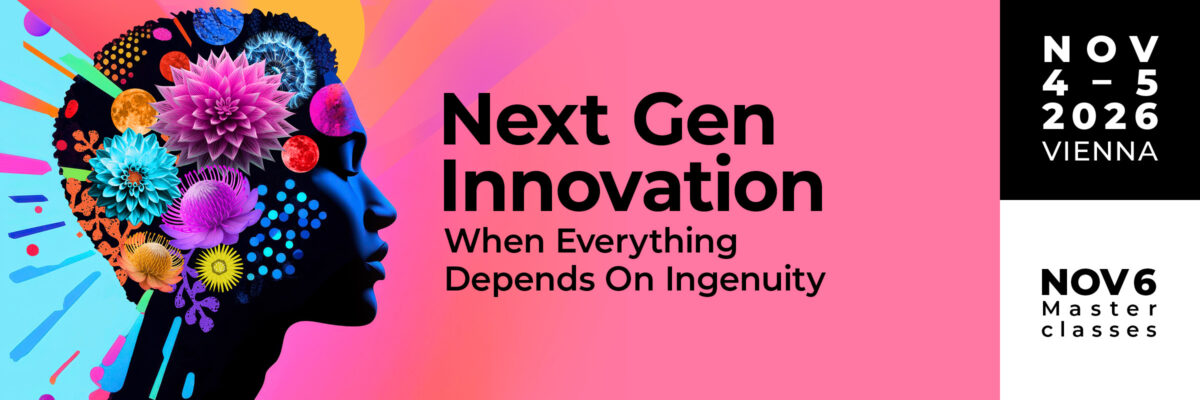
Peter Drucker did not simply name the knowledge economy — he equipped us to navigate it. His central insight was profound: when knowledge became the primary resource of advanced economies, the knowledge worker would become the defining agent of value creation.
For more than half a century, that framing guided management theory and practice. Yet today, the conditions Drucker described have shifted. Knowledge — once scarce and unevenly distributed — has become abundant, searchable, and increasingly automated. Artificial intelligence, cloud platforms, and machine-learning tools now execute tasks that once belonged exclusively to professionals.
This does not render Drucker’s contribution obsolete. Rather, it brings his work to an inflection point — and reveals the next evolution of his thinking.
Drucker’s Insight, Extended
In Post-Capitalist Society (1993), Drucker characterized knowledge as the central resource of modern economic life. The knowledge worker, he argued, would be self-managing, responsible for continual learning, and evaluated by their contribution.
Drucker also warned that knowledge yields value only when applied toward results. “Knowledge has to be improved, challenged, and increased constantly,” he wrote, “or it vanishes.”
Today, that vanishing is visible — not because knowledge is disappearing, but because its scarcity value is.
If nearly any person — or machine — can access domain expertise instantly, then knowledge can no longer serve as the primary source of competitive advantage.
We have crossed the boundary of Drucker’s original paradigm.
The Limits of the Knowledge Worker Model
In its prime, the knowledge-worker concept reshaped organizations and economies. It fueled innovation in medicine, finance, and technology. It enabled more autonomous, purposeful work.
But the model now strains under three realities:
1) Ubiquity of knowledge
Search and AI tools make expertise widely accessible, compressing its strategic value.
2) Shrinking skill half-life
Durable competencies decay rapidly as technology advances.
3) Automation of cognition
Computational systems increasingly perform tasks once synonymous with professional identity — drafting briefs, analyzing data, writing code, generating designs.
These conditions do not negate the importance of knowledge — but they expose the need for a new economic actor, one whose value stems not from knowledge possession but from the capacity to transform knowledge into new forms of value.
The Value Creator
The Value Creator represents the next stage in Drucker’s lineage.
They convert knowledge — human and machine — into meaningful outcomes under conditions of uncertainty.
Where knowledge workers apply expertise, Value Creators:
- Reframe challenges
- Coordinate diverse actors
- Build trust across boundaries
- Learn rapidly and recursively
- Generate novelty
Their defining strength is synthesis: combining insight, context, and technology to produce results that did not previously exist.
Core capabilities include:
Relational Acuity
Value creation increasingly occurs through interaction. Trust, alignment, and shared purpose become economic resources.
Adaptive Intelligence
Value Creators shift mental models fluidly, iterating in real time.
Meta-Learning
They understand how they learn — integrating new knowledge with speed and discernment.
Ecosystem Orchestration
They leverage networks — teams, platforms, machines — to co-create outcomes.
Drucker taught that contribution is the core measure of work. Value Creators embody this principle — but in a new context of ubiquitous knowledge and intelligent tools.
Organizations as Living Systems
When value emerges through interaction, organizations must operate less as hierarchies and more as ecosystems. Advantage depends on interaction capital — the ability to enable productive collaboration among diverse contributors.
This shifts organizational design:
- From control → enablement
- From roles → capabilities
- From planning → experimentation
- From static structure → dynamic configuration
The leader becomes a designer of conditions, not a distributor of instructions. Their role is to foster clarity of purpose, psychological safety, and freedom to explore — the essential soil for emergence.
This is not softer management; it is more demanding.
It requires humility, responsiveness, and the discipline to remove friction while leaving agency intact.
Leadership for Emergence
Drucker wrote that leadership is not charisma but the capacity to raise people to higher levels of performance and vision. Today, this means cultivating the circumstances in which others can create value beyond what hierarchy or expertise alone can generate.
The evolving leadership profile centers on:
- Shared purpose
- Trust and transparency
- Cross-boundary integration
- Rapid learning
- Stewardship of autonomy
The core question for boards and executives becomes:
Are we managing for efficiency — or leading for emergence?
Those who take the latter path create enduring capacity for value creation in a world where knowledge is democratized.
A New Agenda for Education and Policy
Education was designed to prepare people to possess knowledge. It can now prepare people to create value.
This requires:
- Inquiry over memorization
- Experimentation over certainty
- Collaboration over isolation
Public policy can likewise expand participation by ensuring broad access to tools, platforms, and networks that support entrepreneurial capability.
When knowledge is everywhere, the differentiator becomes what people can do with it.
Completing the Arc
The post-knowledge economy does not break from Drucker — it completes him.
He taught that knowledge, well applied, is the foundation of contribution.
We now see that contribution depends on the human capacity to integrate knowledge — human and machine — into new forms of value.
The knowledge worker transformed the 20th century.
The Value Creator will define the 21st.
Our task is to design organizations, institutions, and cultures that enable Value Creators to flourish.
About the authors:
Mark Béliczky is a CEO, board member, and leadership advisor who helps organizations thrive through purpose, adaptability, and value creation. A Partner at CXO Partners, he has served in senior executive roles across global enterprises and growth ventures. He is also a speaker and author of more than 150 published articles on modern leadership, value creation, and organizational transformation.
Hunter Hastings is a business educator and an author and researcher on the subject of the future of management. He is a managing partner at Bialla Venture Partners, a series of seed-stage venture capital funds, and a former CMO at JBS Foods.

